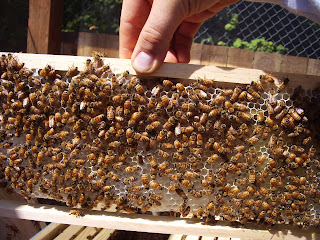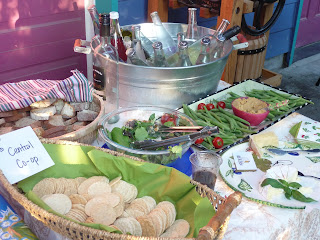Lettuce Link Intern Rhona visited the Twin Ponds Community Garden this summer.
Nestled within Twin
Ponds Park, a $30,000 initiative by the City of Shoreline City Council to create
a community garden resulted in today’s Twin Ponds Community Garden. Since 2010,
the once-fallow area previously mined for peat consists of 38 garden plots,
water hydrants, shed, gathering area, and most notably, a “giving garden”
staffed by volunteers for food donation. Along with being an effective use of
land and promoting views of a “healthy city,” Twin Ponds Community Garden
strives to stimulate community interaction and improve economic development
within the area.
A walk past the Honey,
Mason, and Spelling beds, all food donation beds commemorated after different
types of bees, spans 17 plots and growing – and not a minute is spared. Beds
are turned over as soon as the harvest is in, crops are rotated to keep the
soil nutrient-rich, and volunteers are year-round to ensure maximal yield of
the land, no time wasted nor inch spared.
Upon arriving to Twin
Ponds, Nancy, a 4th year garden coordinator, led me on a tour of the
community garden, proudly pointing out the zucchinis, squash, and tomatoes that
were starting to come out. She led me past some well-maintained P-Patch gardens
with quirky garden art hugging the vegetation, past the giving gardens, and to
the garden gathering area, where garlic sprouts were sun-bathing on the picnic
table. She and three others, Shellie, Randy, and Mical, were appointed by the
city to head each work day, to oversee farm operations, and to communicate with
their local food banks – a year-round effort.
Twin Ponds Community
Garden is not only an example of sustainable gardening, but it is one of many
symbols of community engagement. Here, we have neighborhood interaction and
community cooperation – a badge of sustainability and service that the city of
Shoreline can proudly wear.



















































